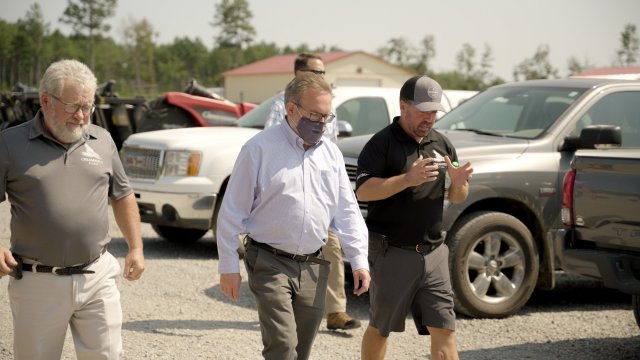EPA Administrator Wheeler Concludes Mid-Atlantic and Southeast Swing Visiting EPA Research Facilities, Meeting with Agricultural Stakeholders
Richmond, Va. (August 26, 2020) — Today, U.S. Environmental Protection Agency (EPA) Administrator Andrew Wheeler concluded a three day visit through the Mid-Atlantic and Southeast region with a visit to EPA’s Research Triangle Park (RTP) campus in Raleigh, N.C. and an address at a farm in Mechanicsville, Va.
“EPA has made it a priority during the Trump Administration to improve our relationship with American farmers and ranchers who do so much for the country,” said EPA Administrator Andrew Wheeler. “Managing fertilizer is one of the biggest environmental challenges growers face, and this Challenge aims to innovate in original ways.”
Administrator Wheeler began his day visiting EPA’s offices in RTP, which houses over 15 program offices that serve as a major center for air pollution research and regulation. During his visit to the campus, he cohosted a virtual agriculture event with U.S. Secretary of Agriculture Sonny Perdue where they unveiled the Next Gen Fertilizer Challenges (LINK), a joint EPA-U.S. Department of Agriculture (USDA) partnership and competition to advance agricultural sustainability in the United States. The competition includes two challenges that seek proposals for new and existing fertilizer technologies that maintain or improve crop yields while reducing environmental impacts compared to conventional fertilizers.
This competition will advance U.S. agriculture by increasing the efficiency of nutrient-based fertilizers in ways that lower their impacts on the environment. To promote the challenge, EPA is coordinating with the Fertilizer Institute, the International Fertilizer Development Center, the National Corn Growers Association, and The Nature Conservancy.
Following the announcement with the USDA, Administrator Wheeler departed Raleigh to visit Creamfield Farms in Mechanicsville, Va. where he addressed a group of farmers to promote the newly announced Next Gen Fertilizer Challenges. In his address, Administrator Wheeler reaffirmed the Trump Administration’s commitment to working with the agriculture industry and touted the challenges’ that will result in lower costs to farmers and consumers, all while reducing the negative impacts excess nitrogen and phosphorus have on our environment.
“As stewards of the land, farmers play a central role in protecting and conserving the environment — including the unique ecosystem we have along the Chesapeake Bay,” Congressman Rob Wittman (VA-01) said. “I am excited to see the launch of the EPA and USDA Next Gen Fertilizer Challenge to spur further innovation and achieve greater advancements in environmentally sustainable agriculture. Our farmers are our future, and I am proud to represent the farmers, foresters, and producers who call our region home.”
While on this Mid-Atlantic and Southeast swing, Administrator Wheeler and EPA Mid-Atlantic Regional Administrator Cosmo Servidio toured the Virginia Port Authority in Norfolk and saw firsthand the cleanup and redevelopment success at the Former Nansemond Ordance Depot Superfund site in Suffolk, Va. Though the site is still undergoing cleanup, the formerly used defense site has been transformed into a thriving community that has showcased the importance of successful remediation and redevelopment. To date, 26 on-site businesses are employing approximately over 700 people with annual sales revenue reported at $60.2 million. The Trump Administration has made it a priority to cleanup Superfund sites and redevelop communities adversely impacted by toxic, surrounding environments.
In North Carolina, Administrator Wheeler made stops in Fayetteville, Fuquay Varine, and Dunn with EPA Region 4 Administrator Mary Walker. At a polyfluoroalkyl substances (PFAS) roundtable hosted by U.S. Congressman Richard Hudson (NC-08), Administrator Wheeler, touted the Trump Administration’s commitment aggressively address PFAS. EPA has made significant progress implementing the PFAS Action Plan — the most comprehensive cross-agency plan ever to address an emerging chemical of concern.
At the roundtable, Administrator Wheeler launched an innovation challenge to identify solutions to destroy PFAS. The Innovative Ways to Destroy PFAS Challenge is a partnership between federal and states agencies seeking detailed plans for a non-thermal technologies to destroy PFAS in concentrated aqueous film forming foam (AFFF), a type of firefighting foam.
At the Jay Adcock Farm, EPA Region 4 Administrator Walker signed a Memorandum of Understanding (MOU) with North Carolina Department of Agriculture and Services (Department) Commissioner Steve Troxler. The MOU reaffirms EPA’s commitment to work as closely as possible with the Department to promote and improve agriculture, protect consumers, and conserve farmland and natural resources for all North Carolinians.
In Dunn, N.C., Administrator Wheeler toured Brownfields redevelopment work, specifically two projects in which EPA has conducted environmental work on 15 properties in its Fayetteville Avenue corridor. Under President Trump, EPA has delivered approximately $287 million in Brownfields grants directly to communities and non-profits in need. In FY 2020, 151 communities were selected to receive 155 grants totaling $65.6 million in EPA Brownfields funding through our Assessment, Revolving Loan Fund, and Cleanup Grants. Of the selected communities, 118 can potentially assess or clean up brownfield sites in census tracts designated as federal Opportunity Zones.
###


